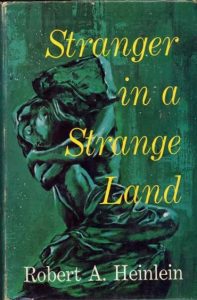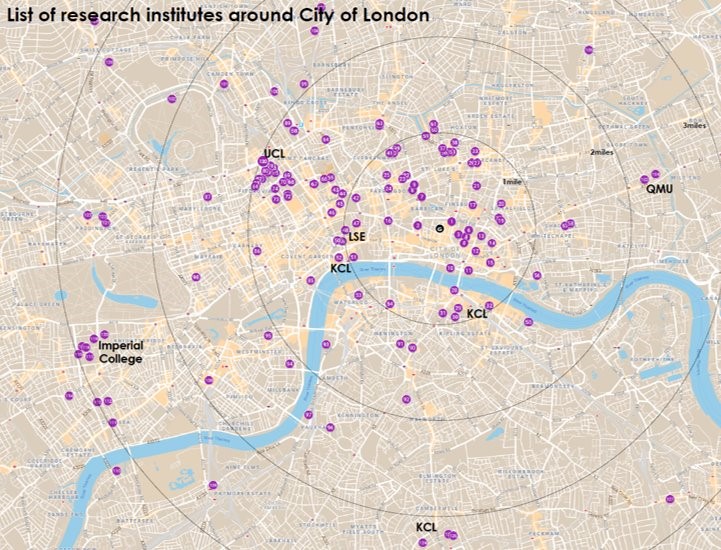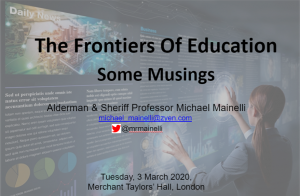Remarks to:
Livery Education Conference – Preparing Young People For The Future
Alderman & Sheriff Professor Michael Mainelli MStJ FCCA FCSI(Hon) FBCS, Tuesday, 3 March 2020, Merchant Taylors’ Hall, London
“The Frontiers Of Education – Some Musings”
Masters, Wardens, Headteachers, ladies and gentlemen:
I have been asked to talk about education of the future, so I’ll start from the past. Exodus 2:22, King James’s Version, says: “And she bare him [Moses] a son, and he called his name Gershom: for he said, ‘I have been a stranger in a strange land’.”

Based on this extract from Exodus, in 1961 Robert A Heinlein wrote a book, “Stranger In A Strange Land”, along a religious education theme. The book tells the tale of a human boy being raised by Martians coming to earth. The boy struggles enormously to reconcile two cultures, one open, one closed, ultimately founding a way to teach mankind how to be homo superior, and becomes a martyr along the way.
We are born polymaths, interested in everything. Then we are killed off, often by education itself. At birth we are all strangers in a strange land. The purpose of education is to help us deal with that strangeness. Theologian Timothy Radcliffe talks about universities as places where we “learn to talk to strangers.”
I would like to share with you a positive view from our past. A movement called ‘New Learning’ started about 250 yards from here at Tower 42, around the same time as this City began to thrive, the late 15th century. New Learning was heretical, subversive, and radical. It meant something big. Today we call it humanism.
New Learning’s English adherents included John Colet of St Paul’s School, Sir Thomas More, and Francis Bacon, who even married an Alderman’s daughter. Desiderius Erasmus of Rotterdam, “Prince of the Humanists”, lodged in the finest ward in the City of London, Broad Street, famously leaving in 1513 without settling his wine bill because of poor quality wine in my ward.
Sir Thomas Gresham, arguably the richest commoner in Europe, decides in his Will of 1575 to donate the vast bulk of his monies to Gresham College to further the New Learning and humanism. It is as if Bill Gates or Warren Buffet bequeathed their monies to Modern Monetary Theory or time travel research. In a tolerant City, Gresham College nurtured open discourse, assembly, and publication, starting immediately with Henry Briggs popularising John Napier’s natural logarithms, but in Base 10.
Humanism led to the Scientific Method. The Royal Society was a child of the City of London, founded at Gresham College, site of today’s Tower 42. The City of London has always been a City of Ideas.
Commerce fuelled science, and the City was, as it has been for centuries, a giant SME creation engine. Today’s giant financial firms were mostly SMEs 35 years ago. We have 24,000 SMEs in the City that will become the next generation’s giants. I believe these giants will be knowledge firms, and the weight of history is on my side. Using the wonders of geographic information systems, City officers have drawn me maps of 130 research institutes, 74 universities, and 41 royal societies and academies, all well within three miles of Mansion House. Virtually all of our City firms are knowledge firms. Traders trade information. Creative and media firms trade stories. Scientists work on hazardous chemical assessments for Lloyd’s of London, on oil spill dispersion for the shipping industry, on DNA sequencing, and quantum computing. Perhaps we need a Knowledge Mile to intersect with our Culture Mile.

Ideas themselves are amazing. Our bodies turn foodstuffs into electrical patterns in our brains that we then transmit with one another and change the world. I happen to like Richard Dawkins’ concept of idea replicators, called memes. From his book The Selfish Gene: “Examples of memes are tunes, ideas, catch-phrases, clothes fashions, ways of making pots or of building arches. Just as genes propagate themselves in the gene pool by leaping from body to body via sperms or eggs, so memes propagate themselves in the same pool by leaping from brain to brain?” In some ways, these viral memes take us over. Much of mankind’s output, our technology, our energy, our resources, our time, our brain-width are subverted to the cause of replicating music memes. We can imagine memes as seeds of ideas showering down upon the earth, randomly distributed. We can expect great ideas in small countries and large ones, roughly on a per capita basis. Our job must be to nurture them. To treat ideas like seeds that need the right soil, the right nutrients, the right sunlight and the right water to grow, and then propagate.
Mankind changes the world through ideas. I agree with H G Wells that: “Human history is in essence a history of ideas”. I would suggest that ideas change the world in three ways. First, an idea can inspire change — consider the idea of “betterment”, say Kantian idealism, or progress. Second, an idea can change the way you think – take Popperian falsification for example. Third, shared ideas can make people more effective at working together — the scientific method unites researchers around the world. That said, like any source of power, ideas can inspire ruin, damage the way you think and help people wreak mutual havoc by slavishly following harmful ideas. We need structure.
The physicist David Deutsch remembers in his book The Fabric of Reality the wonder of being told as a small child “that in ancient times it was still possible for a very learned person to know everything that was known.” He points out that a good interpretation of ‘everything’ was that the very learned person should have the right concepts, explanations, and theories to understand and explain the fabric of reality. Deutsch contends that the four key theories for understanding the universe are quantum physics, epistemology, the theory of computation and the theory of evolution. Deutsch prompts an excellent, similar question for me, “what should a learned person know in order to know everything that is known about the future of education?”
I would outline four areas for discussion about the future of education – social, technical, economic, and political – and leave each with a question for today:
Social – we can see that current trends make social skills and fusion of skills more important. Multiple initiatives of blended learning, e.g. Tesla Academies and Code Academies, let alone MOOCs, lead to circuits of online and bricks-and-mortar and industry lessons. Spot, rather than lifetime, employment increases the importance of self-curated curricula, continuous learning, and professional development. We can postulate examinations where ten groups of one hundred students are communicating online throughout an examination because the goal is to get everyone in your group ‘over the line’. We can also see though that the social pressures of determining ‘what is true and what is fake’ are moving more strongly towards directing ‘what is taught and what is not’. Actuaries here today might note that we are good at conveying misleading averages, and poor at demonstrating ranges.
Question – how do we properly feed back to students the real job market, the real labour market information, a range of incomes not a specific salary, the likelihoods of unemployment, the volatility of employment, and the tools to do something about it?
Technical – ‘technology’ is the study of craft or art. Technology consists of the crafts and arts of manipulating our world. Douglas Adams defined technology as “a word that describes something that doesn’t work yet.” We could look at fascinating applications of technology to education, such as how smart ledgers (aka blockchains) might provide useful lifetime identities and credentials, but I’d like to note a broader trend. Increasingly, technology is also shorthand for information & communications technology (ICT). That is not surprising. More and more we control all technology through ICT.
We simulate technology through ICT. We simulate future technologies through ICT. Without doubt, even if we believe some students are not highly skilled at ICT, they should be capable of understanding the world through the eyes of the ICT-enabled. The failure of the last century’s ICT education was focusing on computer skills, teaching children to help Microsoft build its monopoly. The success of subsequent initiatives such as Raspberry Pi or code academies is getting children to see the world through the eyes of the ICT-enabled. To imagine what might work in the future. Increasingly, the simulators are likely to be our biggest interface. Pilots today can barely tell the difference between simulator and aircraft, between education and reality. Virtual reality and augmented reality technologies are probably killer apps in two large economic sectors, and one of them is education. Douglas Adams knew we were on a treadmill, also noting, “We are stuck with technology when what we really want is just stuff that works.” It is increasingly clear that the simulation of technology itself is a skill.
Question – should we be prepared to push all education through simulators?
Economic – globalisation increases pressure for flexible micro-skill accumulation and globally useful accreditation and certification. Education for life implies constant expenditure leading to either all state-funded or minimally state-funded polarities. Education for life implies flexibility. Should we be promoting ‘vocational insight programmes’, work experience, whatever, more forcefully? Apprenticeships are all well and good, but we need to expose young people very early on to many jobs before we push them to choose their most appropriate roles.
Economic benefit arguments threaten the social usefulness of some education, or label other education as self-indulgent. We can even see the economic arguments making our children chattels of the state. Have you fully repaid your medical or engineering training before you emigrate? Last year’s “Post-18 Review Of Education And Funding”, the Augar Review, suggested extending student loan repayments from 30 years to 40 years. In a country that can’t plan pensions 40 years out, the proposal asked students of 18 to enter into arrangements for 35 more years bondage than most indentured servants had. We need a richer model for thinking about the economics of education. Roger Gault talks about “earn while you learn”. I might add “invest in your mind”. But the idea that you might pay for a lifetime of investment up front – think paying for a lifetime of bread today – doesn’t stack up. Surely, our City can package learning and finance with innovative structures such as employment augmentation bonds.
Question – how do we build a lifetime funding model for self-improvement?
Political – Equality, social mobility, and quality of life arguments increasingly highlight the role of the education system in achieving political and social goals. Many goals are being thrown at the education system willy-nilly, e.g. as we see as Sheriffs, crime reduction among youth.
How should the civic team lead on these opportunities? The civic team works to strengthen our community of over 500,000 workers and 9,000 residents. The Lord Mayor will travel over 100 days to more than 25 countries making nearly a thousand speeches to promote our centre of excellence. We Sheriffs stay here at home, judging prizes, giving out school awards, and dancing round maypoles.
Our long-term objectives are to create prosperity, share success, and enrich our environment. We have clear strategic themes:
- Promoting the business, professional, technical, and financial services of the City and the UK;
- Increasing impact of charitable and voluntary activities;
- Continuing to develop London as THE global city.
Education is core to our objectives.
Question – how can an educational system, in fact any process system, genuinely encourage mental diversity, and if so, how can we measure it?
We need to encourage diversity of thinking. Some of this diversity has emerged from appropriate competition in education and to education. How can we foster more of that?
Finally, how can I demonstrate a lack of diversity? Now my doctorate is in statistics. So, for example, last weekend a friend asked for my help. He wanted me to round up his 37 sheep. I said “40”.
Heinlein talked about strange, but I might add foreign. The idea behind education is to make the mundane foreign, and the strange mundane. And behind all of this is the idea of diversity of thinking. Not whether you wear a skirt or trousers, or how strong your tan-line seems.
One day a teacher asks her student Johnny, ‘Johnny, if there are two birds on a wire and I fire two barrels from a shotgun, how many birds will I hit?’. ‘One, Miss’. ‘Johnny, please listen, if there are two birds on a wire and I fire two barrels from a shotgun, how many birds will I hit?’. ‘One, Miss’. ‘Why Johnny?’. ‘Well Miss, after you fire the first barrel the second bird will fly away.’ ‘Johnny, that’s the wrong answer, but I like the way you think.’
The next day Johnny comes into the classroom. ‘Miss, my Dad says that I must save my allowance. One bank offers me an educational booklet. The other bank has a very pretty teller. Which bank should get my account?’ The teacher blushes, and says, ‘Well, perhaps the one with the very pretty teller?’ Johnny replies, ‘No Miss, the one with the biggest government guarantee, but I like the way you think!’.
So, no joke, are we celebrating true measures of diversity and creativity, admiring the way people think, not just celebrating idiosyncrasies. And that’s why I admire the work of the Educators and Actuaries today, bringing people together to spark new ideas. That’s why Livery Schools Link, of which I’ve long been a supporter, means so much. Connecting people from disparate backgrounds generates questions and fosters diversity and creativity.
I hope questions on social, technical, economic, and political aspects of education challenge thinking, not just generate useless controversy. To recap:
- social – how do we engage with life-long learning?
- technical – can we rise to the age of simulation?
- economic – how can we provide lifetime funding?
- political – how do we measure and encourage diversity?
In conclusion, how can we move from strangers in a strange land to friends in a shared home? Thus a final question, when would we know our education system is working?
We scientists know that if you’re not part of the solution, you’re part of the precipitate. So it’s time for me to fall out, and us to return to the solutions in the coffee cups.
Thank you.

